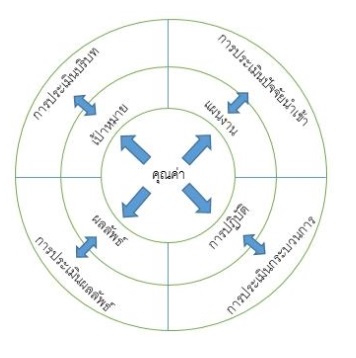การจัดการศึกษาทางไกล: หลักสูตรพยาบาลศาสตรมหาบัณฑิต สาขาวิชาการบริหารทางการพยาบาลมหาวิทยาลัยสุโขทัยธรรมาธิราช
คำสำคัญ:
การจัดการศึกษาทางไกล, หลักสูตรการบริหารทางการพยาบาล, สาขาวิชาพยาบาลศาสตร์บทคัดย่อ
การวิจัยเชิงประเมินผลนี้ มีวัตถุประสงค์เพื่อประเมินด้านบริบทและปัจจัยเบื้องต้น ปัจจัยนำเข้า กระบวนการและผลลัพธ์ การใช้หลักสูตรพยาบาลศาสตรมหาบัณฑิต สาขาวิชาการบริหารทางการพยาบาล ฉบับปรับปรุง พ.ศ. 2561 จากประชากรจำนวน 256 คน แบ่งเป็น 2 กลุ่ม คือ กลุ่มที่เก็บข้อมูลเชิงปริมาณ จำนวน 128 คน และกลุ่มที่เก็บข้อมูลเชิงคุณภาพ จำนวน 25 คน ประกอบด้วย 1) ผู้ทรงคุณวุฒิภายนอก 2) อาจารย์ผู้รับผิดชอบและอาจารย์ประจำหลักสูตร 3) อาจารย์ประจำสาขาวิชาพยาบาลศาสตร์ 4) บุคลากรสายสนับสนุน 5) ผู้สำเร็จการศึกษา 6) ผู้บังคับบัญชาผู้สำเร็จการศึกษา และ7) เพื่อนร่วมงานผู้สำเร็จการศึกษา เก็บข้อมูลในระหว่างเดือนพฤษภาคมถึงเดือนมิถุนายน เครื่องมือที่ใช้ในการวิจัยสร้างขึ้นตามกรอบการประเมินผลแบบ CIPP Model ของสตัฟเฟิลบีม มี 2 ชุด คือ 1) แนวคำถามการสนทนากลุ่ม และ 2) แบบสอบถาม เกี่ยวกับการจัดการเรียนการสอนของหลักสูตร ค่าดัชนีความความตรงเชิงเนื้อหา เท่ากับ 0.67-1.00 และค่าสัมประสิทธิแอลฟาของครอนบาค ระหว่าง .95- .99 ผลการวิจัยพบว่า
ด้านบริบทและด้านปัจจัยนำเข้ามีความเหมาะสมอยู่ในระดับมากที่สุด ด้านกระบวนการจัดการเรียนการสอนมีความเหมาะสมในระดับมาก และด้านผลลัพธ์จากการใช้หลักสูตรความเหมาะสมอยู่ในระดับมาก ซึ่งเป็นการแสดงว่าหลักสูตรการบริหารทางการพยาบาล ฉบับปรับปรุง พุทธศักราช 2561 ยังมีผลลัพธ์การเรียนรู้ได้ในระดับดีมากถึงมากที่สุด
ผลการศึกษาครั้งนี้สามารถนำไปสู่การปรับปรุงหลักสูตรใหม่ฉบับ พุทธศักราช 2566 ทั้งนี้ เพื่อให้ได้ผลลัพธ์การเรียนรู้ที่มีความสอดคล้องกับสถานการณ์ สภาพบริบทและสุขภาพวิถีใหม่ในปัจจุบันอย่างเหมาะสม
เอกสารอ้างอิง
References
Atiya Saraketrin, Daravan Rongmuang & Rungnapa Chantra. (2019). Nursing Education in the 21st Century: Competencies and Roles of Nursing Instructors. Journal of The Royal Thai Army Nurses, 20(1), 12-20. (In Thai)
Blake, N. (2022). Future of Nursing 2020-2030: Supporting the Health and Well-being of Nurses. AACN Advanced Critical Care, 33(1), 99-102.
De Prada E., Mareque M., and Pino-Juste M. (2022). Teamwork skills in higher education: is university training contributing to their mastery? Psicologia: Reflexão e Crítica, 35(5),1-13.
Jintana Artsanthia1 Sunan Leeissarapong2 Patchanee Tamwattananugul. (2022), Future Nursing Educationinthe VUCA World Changingfrom the 2019 Coronavirus Pandemic Situation. APHEIT Journal of Nursing and Health, 4(2), 1-11.
Kennan Foundation-Asia. (2020). 3 Consequences of COVID-19 on Thai Education. Rerived May 14, 2023 from https://www.kenan-asia.org/th/covid-19-education-impact/.
Ljungbeck, B., Sjogren, Sjogren Forss K., Finnbogadottir, H., & Carlson, E. (2021). Content in nurse practitioner education – A scoping review. Nurse Education Today ,98,1-10.
Ministry of Education. (2018). Announcement of Ministry of Education on Graduate Qualification standards Bachelor of Science in Nursing, 2017. Rerived November 15, 2023 from http://www.mua.go.th and http://www.tamanoon.com/eduact/PDF/Act/Education 2542. Pdf. (In Thai)
Office of the national Higher Education, Science Research, and Innovation. (2022) The Report on Thai Higher Education in the context of a Developed Country No. 1: Product and Development of Manpower according to National needs. Bangkok: Ministry of Higher Education, Science Research, and Innovation. (In Thai)
Pramote Thangkratok, Bussarin Lhimsoonthon, Natchaya Palacheewa, Arbkhanok Tongtham. (2021). Online Nursing Education during the Coronavirus-19 Pandemic: A Case Study of the Epidemiology Course. Journal of Thailand Nursing and Midwifery Council. 36 (3) July-September. P 31-44. (In Thai)
Saisamorn Chaleoykitti, Jintana Artsanthia & Magdalena Supaporn Daodee. (2020). The Effect of COVID-19 Disease: Teaching and Learning in Nursing. Journal of Health and Nursing Research, 36(2), 255-261. (In Thai)
School of Nursing. (2018). Master of Nursing Program in Nursing administration, revision 2018. Nonthaburi: Sukhothai Thammathirat Open University. (In Thai)
Sirichai Kanchanawasi. (2015). Curriculum assessment: principles and Practices. Retrived April 2, 2023 from http://www.edu.tsu.ac.th/major/eva/files/journal/scan1.pdf. (In Thai)
Stufflebeam, D.L. (2000). The CIPP Model for Evaluation. n D. L. Stufflebeam, G. F. Madaus, & T. Kellaghan (Eds.), Evalutaion Models: Viewpoints on Educational And Human Services Evaluation (2nd ed., pp. 280-317). Boston, MA: Kluwer Academic.
Sukhothai Thammathirat Open University. (2021). Sukhothai Thammathirat Open University Announcement on desirable Graduate Qualifications 2021. Retrived October 14, 2022 from https://vpn.stou.ac.th/+CSCO+00756767633A2F2F72667265697670722E666762682E6E702E6775++/main/reinventing2022/index.html# (In Thai)
Sukhothai Thammathirat Open University. (2022). STOU Reinventing Plan 2022-2026. Retrived November 27, 2022 from https://www.stou.ac.th/offices/opr/planning/pl_main_v2.1/up/(O4)%20-%20Reinventing%20Plan%202565-2569.pdf (In Thai)
Taba, H. (1962). Curriculum Development: Theory and practice (p.310) New York: Harcourt Brace and World.
Thailand Nursing and Midwifery Council. (2018). Announcement of the core competencies of graduates qualification standards in Bachelor of Science, Higher degree and Advanced practitioner in Nursing. Thailand Nursing Council. Retrived April 8, 2023 from https://www.tnmc.or.th/images/userfiles/files/004.pdf. (In Thai)
Thanin Auapithorn. (2017). “How will humans create new skills-learning o cope with future, changes?” Retrived Octoble 4, 2023 from https://thestandard.co/learning-for-change/. (In Thai)
Wattanaporn RaNguptook. (2020). Thai Learners’ Key Competencies in a VUCA World. Journal Of Teacher Professional Development, 1(1), 8-18. (In Thai)

ดาวน์โหลด
เผยแพร่แล้ว
ฉบับ
ประเภทบทความ
สัญญาอนุญาต
ลิขสิทธิ์ (c) 2023 วารสารการพยาบาลและการศึกษา

อนุญาตภายใต้เงื่อนไข Creative Commons Attribution-NonCommercial-NoDerivatives 4.0 International License.





